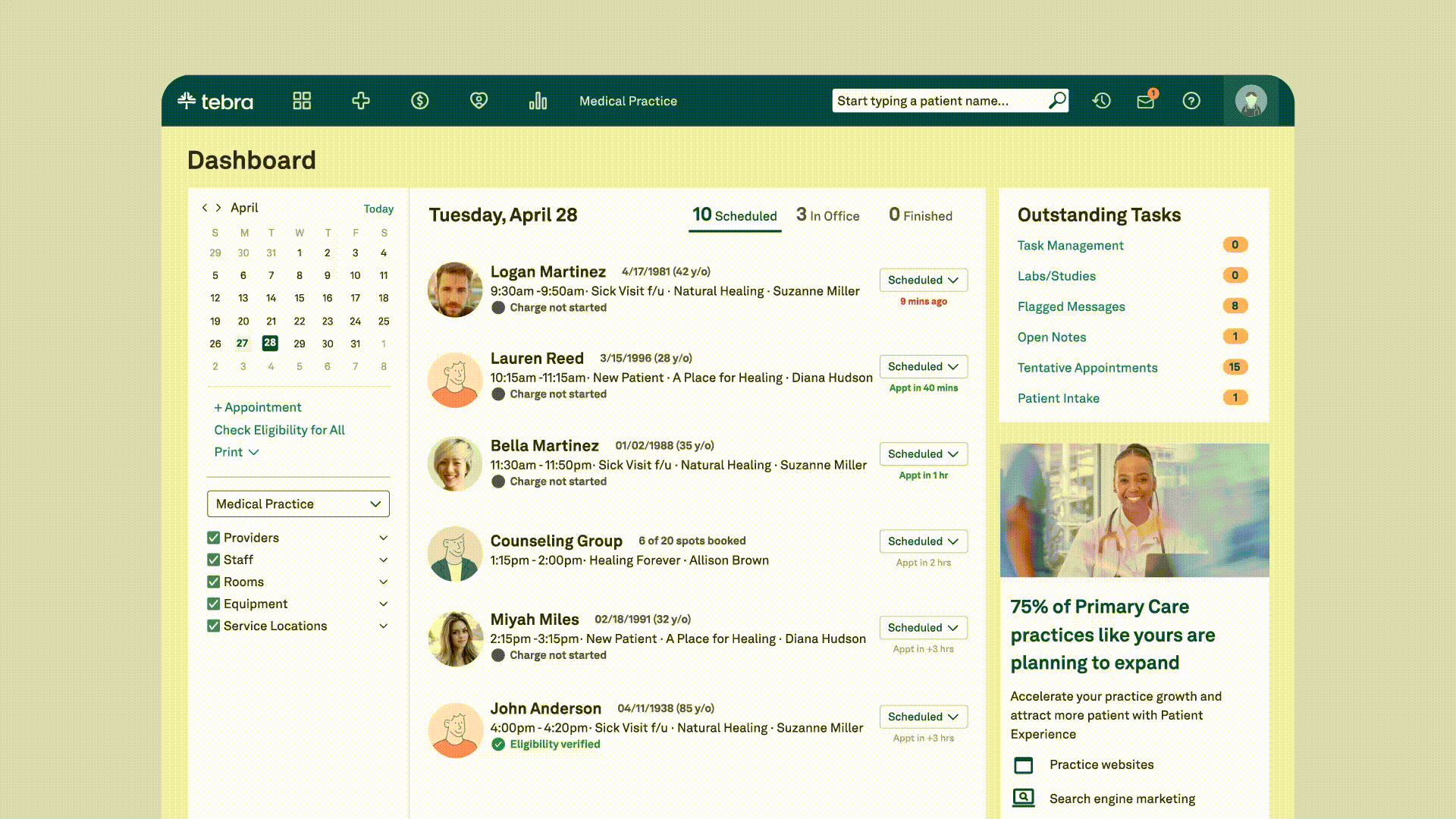Top 5 qualities every front desk manager needs for exceptional, patient-focused care
Without the right person, your front desk operations can break down.

At a Glance
- A successful front desk manager combines empathy with professionalism to create positive patient experiences, streamline operations, and ensure smooth payment collection.
- The ideal medical front desk manager must master 5 essential skills: empathetic professionalism, communication, problem-solving, multitasking, and EHR technology management.
- Supporting your front desk manager with clear SOPs, team alignment, defined responsibilities, and automated tools helps create an efficient medical practice that delivers exceptional patient care.
Your front desk is the control tower and friendly face of your practice. It is the first point of contact for patients, a hub for department communication, and a vital checkpoint for prompt and accurate payments.
Yet too often, this crucial position is an afterthought. Without the right person, your front desk operations can break down. This can erode patient trust and practice reputation, and breed frustration among departments.
No one wants to receive or deliver patient care in a chaotic environment. That’s why you need a front desk manager with the right skill set and traits to promote patient-focused care and enhance overall efficiency.
Keep reading to learn the top 5 qualities to seek when hiring or evaluating front desk managers for your practice.
Top qualities to seek in a front desk manager
Front desk operations may seem straightforward: receive patients and visitors, schedule appointments, assist with paperwork, give directions, and process billings. However, the role demands nuance and skill.
While many factors impact the effectiveness of a front desk manager, here are the most critical traits.
1. Professional and empathic
Most patients visit a medical practice because they’re sick, in pain, anxious, or stressed.
From the moment they enter your practice to the moment they leave, they want to feel safe, comfortable, and welcome. The front desk manager plays an important role in ensuring that they do.
“A capable front desk manager balances professionalism and empathy.”
A capable front desk manager balances professionalism and empathy to listen attentively and understand patients' feelings. They stay professional at all times — even when dealing with difficult patients — and can handle bursts of business with grace. These skills must translate well in person and stay consistent, even when juggling multiple tasks.
Providing a comforting and reassuring presence helps ensure patients leave your practice feeling satisfied and having fulfilled their payment obligations, while establishing your practice as trustworthy and reliable.
2. Strong communicator
A front desk manager often acts as a liaison for your practice. They must be a strong communicator in order to give clear, concise instructions to patients and address their needs.
To communicate effectively, the manager should be familiar with common medical terms, and have basic knowledge of healthcare procedures, privacy laws, and insurance processes. They should be able to effectively communicate with patients about copays — this will provide clarity to patients and help your practice reduce rejections and denials.
Your front desk manager must have answers to queries about the intake process, appointment scheduling, billing issues, and prescription refill requests. This ensures accurate information reaches patients and their families.
Strong communication skills also come into play when managing patient-provider interactions and collaborating with diverse stakeholders, including other staff, providers, and insurance and billing companies. These skills are vital for creating a welcoming and supportive environment for all who enter your practice.
When your patients are happy and satisfied, it can translate to positive doctor reviews, which can help you grow your credibility, patient volume, and revenue.
3. Problem-solver
A hallmark of a successful front desk manager is the ability to think on the go to provide swift resolutions to problems that pop up at the most inconvenient of times.
Medical offices are dynamic, and unexpected issues arise regularly. So, the manager should be nimble, adaptable, and proactive, ensuring minimal disruption to patient care while resolving issues efficiently.
“A hallmark of a successful front desk manager is the ability to think on the go.”
For example, your practice’s scheduling software goes down and patients are waiting to check in. The front desk manager can quickly switch to a manual system to pull up patient records from physical files while maintaining organization to ensure that patients are still seen in the correct order.
Or a patient’s insurance card is expired and they cannot be seen without valid coverage. The manager must quickly find a way to help, such as contacting the patient to see if they have a new card or exploring payment options while ensuring they can still receive necessary care.
Select a candidate whose experience is best suited to the challenges of independent practices, can identify issues, analyze their root causes, and respond to critical situations with composure and decisiveness while upholding your practice’s policy.
4. Organized and a multitasker
The front desk manager wears many hats. They not only offer a warm welcome, but also answer phone calls, scan documents, cross-check details and signatures, verify insurance eligibility and coverage, collect payments, and make sure the patient experience is seamless.
A front desk manager should be organized and able to juggle multiple responsibilities — while providing exceptional customer service.
When hiring or evaluating a front desk manager, consider one with exceptional organizational and strong time management skills. They should be able to prioritize tasks, organize and file critical documentation, and navigate insurance benefits and reimbursements. This is crucial to maintaining the daily flow of the practice, enhancing efficiency, and boosting productivity.
5. EHR and technology management
Over 75% of office-based clinicians in the United States use an electronic health record (EHR) system. It helps them automate processes, reduce administrative errors, improve efficiency, productivity, and profitability, and provide better patient care.
Operating and managing an EHR is a crucial responsibility that requires technical expertise to streamline patient scheduling, maintain accurate records, manage patient communications via portals, and organize critical documentation to support providers.
“Operating and managing an EHR is a crucial responsibility.”
When evaluating front desk managers, seek tech-savvy candidates. They should be proficient in navigating, operating, and managing cloud-based, integrated EHR systems. They should be adept at telecommunication platforms and other technology required to ensure smooth workflows. They should also understand patient privacy laws, including the Health Insurance Portability and Accountability Act (HIPAA).

Supporting your front desk manager long term
Once you find the right hire, it's important to take the right steps to set them up for long-term success. Here are ways you can support them.
Streamline processes
Create standard operating procedures (SOPs) for every task. This creates consistency for your staff and patients. Consider providing step-by-step instructions and visual aids to reduce the risk of error — particularly when it comes to coordinating benefits.
Align your team
Make sure the entire office is aligned so the front desk manager feels empowered to perform their job. Staff and providers should support them and refrain from overriding their decisions when dealing with patients, especially when it comes to billing issues.
Define clear roles
The front desk is often responsible for many different tasks. A clear description of responsibilities can minimize scope creep and help staff focus on critical tasks, such as collecting payments.
Embrace automation
Tedious and time-consuming tasks can be frustrating for your team. Automating activities such as appointment reminders and scheduling can free up your front desk manager to focus on what truly matters: delivering a stellar patient experience.
Find the right front desk manager for your practice
Whether you’re starting a new medical practice and putting together your team, or looking for a strong front office manager to coordinate your front desk staff, it’s important to know how to identify qualified candidates.
Overall, an effective, well-rounded front desk manager should exhibit professionalism and empathy, be a strong communicator, and possess critical skills — such as problem-solving, organization, multitasking, and proficiency with EHRs.
This is by no means an exhaustive list, but selecting a front desk manager with these attributes can improve both patient satisfaction and the operational success of your practice.
You Might Also Be Interested In
Learn how to create a seamless patient experience that increases loyalty and reduces churn, while providing personalized care that drives practice growth in Tebra’s free guide to optimizing your practice.
Subscribe to The Intake:
A weekly check-up for your independent practice

Suggested for you
Get expert tips, guides, and valuable insights for your healthcare practice









